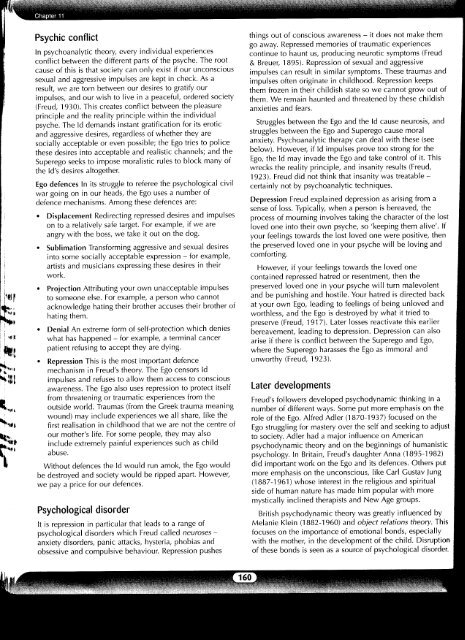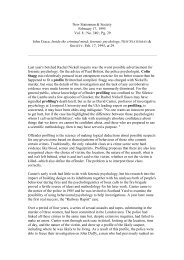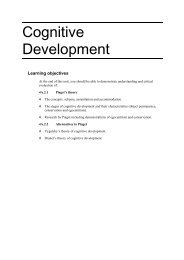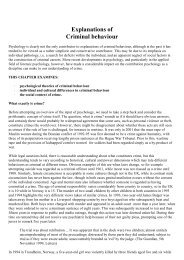Ch 11 - Jeff Standen
Ch 11 - Jeff Standen
Ch 11 - Jeff Standen
Create successful ePaper yourself
Turn your PDF publications into a flip-book with our unique Google optimized e-Paper software.
Psychic conflict<br />
In psychoanalytic theory, every individual experiences<br />
conflict between the different parts of the psyche. The root<br />
cause of this is that society can only exist if our unconscious<br />
sexual and aggressive impulses are kept in check. As a<br />
result, we are torn between our desires to gratify our<br />
impulses, and our wish to live in a peaceful, ordered society<br />
(Freud, 1930). This creates conflict between the pleasure<br />
principle and the reality principle within the individual<br />
psyche. The Id demands instant gratification for its erotic<br />
and aggressive desires, regardless of whether they are<br />
socially acceptable or even possible; the Ego tries to police<br />
these desires into acceptable and realistic channels; and the<br />
Superego seeks to impose moralistic rules to block many of<br />
the Id's desires altogether.<br />
Ego defences In its struggle to referee the psychological civil<br />
war going on in our heads, the Ego uses a number of<br />
defence mechanisms. Among these defences are:<br />
• Displacement Redirecting repressed desires and impulses<br />
on to a relatively safe target. For example, if we are<br />
angry with the boss, we take it out on the dog.<br />
• Sublimation Transforming aggressive and sexual desires<br />
into some socially acceptable expression - for example,<br />
artists and musicians expressing these desires in their<br />
work.<br />
• Projection Attributing your own unacceptable impulses<br />
to someone else. For example, a person who cannot<br />
acknowledge hating their brother accuses their brother of<br />
hating them.<br />
• Denial An extreme form of self-protection which denies<br />
what has happened - for example, a terminal cancer<br />
patient refusing to accept they are dying.<br />
• Repression This is the most important defence<br />
mechanism in Freud's theory. The Ego censors Id<br />
impulses and refuses to allow them access to conscious<br />
awareness. The Ego also uses repression to protect itself<br />
from threatening or traumatic experiences from the<br />
outside world. Traumas (from the Greek trauma meaning<br />
wound) may include experiences we all share, like the<br />
first realisation in childhood that we are not the centre of<br />
our mother's life. For some people, they may also<br />
include extremely painful experiences such as child<br />
abuse.<br />
Without defences the Id would run amok, the Ego would<br />
be destroyed and society would be ripped apart. However,<br />
we pay a price for our defences.<br />
Psychological disorder<br />
It is repression in particular that leads to a range of<br />
psychological disorders which Freud called neuroses -<br />
anxiety disorders, panic attacks, hysteria, phobias and<br />
obsessive and compulsive behaviour. Repression pushes<br />
things out of conscious awareness - it does not make them<br />
go away. Repressed memories of traumatic experiences<br />
continue to haunt us, producing neurotic symptoms (Freud<br />
& Breuer, 1895). Repression of sexual and aggressive<br />
impulses can result in similar symptoms. These traumas and<br />
impulses often originate in childhood. Repression keeps<br />
them frozen in their childish state so we cannot grow out of<br />
them. We remain haunted and threatened by these childish<br />
anxieties and fears.<br />
Struggles between the Ego and the Id cause neurosis, and<br />
struggles between the Ego and Superego cause moral<br />
anxiety. Psychoanalytic therapy can deal with these (see<br />
below). However, if Id impulses prove too strong for the<br />
Ego, the Id may invade the Ego and take control of it. This<br />
wrecks the reality principle, and insanity results (Freud,<br />
1923). Freud did not think that insanity was treatable -<br />
certainly not by psychoanalytic techniques.<br />
Depression Freud explained depression as arising from a<br />
sense of loss. Typically, when a person is bereaved, the<br />
process of mourning involves taking the character of the lost<br />
loved one into their own psyche, so 'keeping them alive'. If<br />
your feelings towards the lost loved one were positive, then<br />
the preserved loved one in your psyche will be loving and<br />
comforting.<br />
However, if your feelings towards the loved one<br />
contained repressed hatred or resentment, then the<br />
preserved loved one in your psyche will turn malevolent<br />
and be punishing and hostile. Your hatred is directed back<br />
at your own Ego, leading to feelings of being unloved and<br />
worthless, and the Ego is destroyed by what it tried to<br />
preserve (Freud, 1917). Later losses reactivate this earlier<br />
bereavement, leading to depression. Depression can also<br />
arise if there is conflict between the Superego and Ego,<br />
where the Superego harasses the Ego as immoral and<br />
unworthy (Freud, 1923).<br />
Later developments<br />
Freud's followers developed psychodynamic thinking in a<br />
number of different ways. Some put more emphasis on the<br />
role of the Ego. Alfred Adler (1870-1937) focused on the<br />
Ego struggling for mastery over the self and seeking to adjust<br />
to society. Adler had a major influence on American<br />
psychodynamic theory and on the beginnings of humanistic<br />
psychology. In Britain, Freud's daughter Anna (1895-1982)<br />
did important work on the Ego and its defences. Others put<br />
more emphasis on the unconscious, like Carl Gustav Jung<br />
(1887-1961) whose interest in the religious and spiritual<br />
side of human nature has made him popular with more<br />
mystically inclined therapists and New Age groups.<br />
British psychodynamic theory was greatly influenced by<br />
Melanie Klein (1882-1960) and object relations theory. This<br />
focuses on the importance of emotional bonds, especially<br />
with the mother, in the development of the child. Disruption<br />
of these bonds is seen as a source of psychological disorder.







